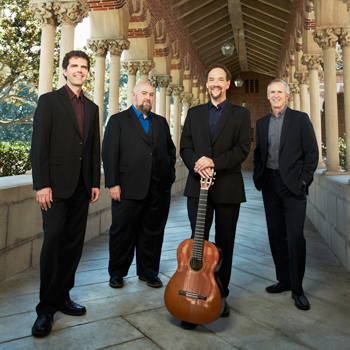Mike Telin

Today, March 17, marks the official release date of LAGQ’s latest CD, New Renaissance, most of which will be presented on Saturdays concert. LAGQ’s program will begin with a section titled Music from the Time of Cervantes. “The idea for the album stemmed from a project we did a few years ago with John Cleese of Monty Python fame,” LAGQ founding member William Kanengiser explained during a telephone conversation. “We met John at a concert we did in Santa Barbara, and he wanted to go to dinner with us. We were start-struck.
“At the end of the dinner he said that we should work together. We of course said OK, but then we had to decide what were we going to do. I had embarked on a year-and-a-half project based around Don Quixote, first adapting the novel into a three-act play, and then I arranged music to accompany the narration, which I called ‘Music from the Time of Cervantes’ because Cervantes could have heard most of these pieces during the Spanish Renaissance. We performed it with Cleese and then toured it with Bill Proctor from Firesign Theater.”
LAGQ began performing some of the music from the show on their recitals without narration, and had great responses from the audience. This prompted Kanengiser to create a sixteen-movement suite of his favorite pieces from the project. “On Saturday I’ll set up each movement in the style that John Cleese and Bill Proctor did with a very brief sentence or two to try to make it more of a dramatic storytelling.”
The recording project took another step forward when the quartet received a new work by Ian Krause. “He’s one of our longtime friends. I met him at USC back in 1977. He was a senior and I was a freshman, Kanengiser recalled. “He’s gone on to become one of the most important composers for the guitar, and specifically the guitar quartet.” Krause’s piece, Music in Four Sharps, is based on John Dowland’s Frog Galliard. Kanengiser described it as a contemporary passacaglia. “Both of the pieces went well together. The Cervantes is Renaissance music in a new way and Ian’s is new music based on Renaissance music.”
LAGQ also commissioned another friend and composer, Dušan Bogdanović, to write a new work for the album. “Dušan’s into every possible style of music from jazz, Balkan, and Asian to Indian ragas. He’s also obsessed with the sixteenth-century master contrapuntal composer, Francesco da Milano. Dušan took one of da Milano’s ricercars and wrote what I like to describe as a kaleidoscope of pieces that look at the original in different ways.”
The CD also includes Scott Tennant’s arrangements of some French chansons, which I have heard on the advance tracks of this stunning CD. “We’re very excited to have this new project out,” Kanengiser said. “We did self-produce it, which is something we are really proud of because we oversaw the entire process from beginning to end.”
Saturday’s program will feature other musical sides of LAGQ as well, with some selections from their Grammy-winning CD, Guitar Heroes, and will conclude with Kanengiser’s arrangement of the complete El Amor Brujo ballet by Manuel de Falla. “In my humble opinion, and I always say this during concerts, when de Falla was scoring it for orchestra, he was really thinking about one big guitar. Everything is in the original key, and I think the essential Flamenco things sound much better on the guitar than in the orchestra. Nothing imitates a strumming guitar better than a strumming guitar. It also allows us to explore our flamenco side.”
In September 2015, LAGQ will celebrate their 35th anniversary. Why did Kanengiser and his colleagues decide to form the group? “We were enrolled in a class called Guitar Ensemble at USC, and our professor, James Smith, and the artist-in-residence, Pepe Romero, thought it would be good for us to form a quartet. At first we were called the USC Guitar Quartet, but when we started getting some little gigs around town, we couldn’t think of any better name than Los Angeles Guitar Quartet. We’ve only had two personnel changes in 35 years, so Scott John and I have been together the entire time. What you could say is that we’re still trying to get a passing grade in that ensemble class.”
Published on ClevelandClassical.com March 17, 2015.
Click here for a printable copy of this article


